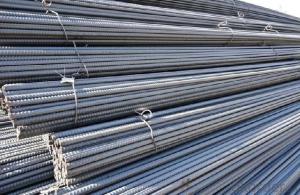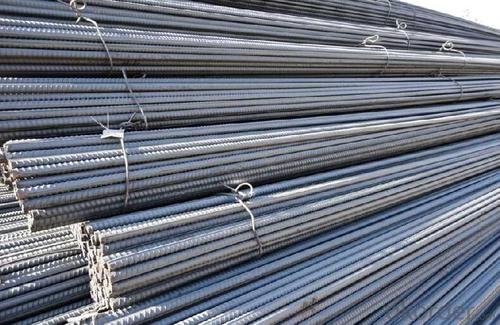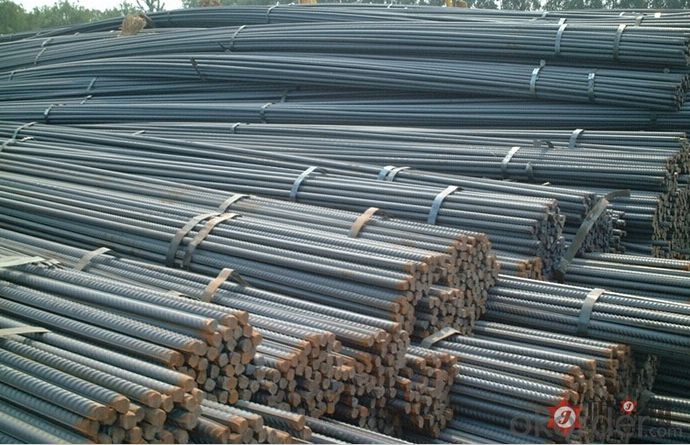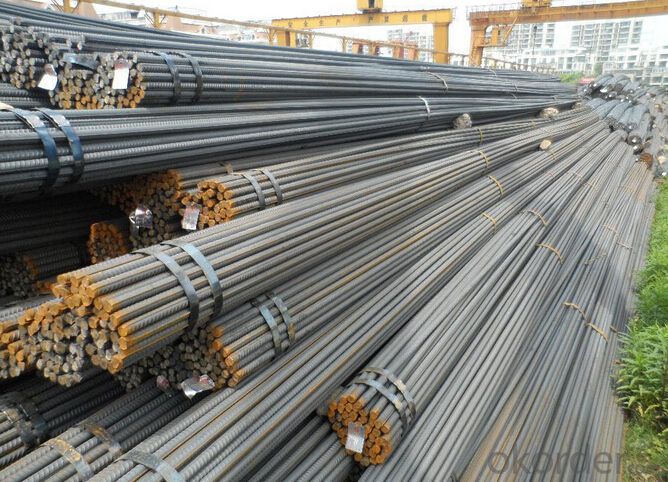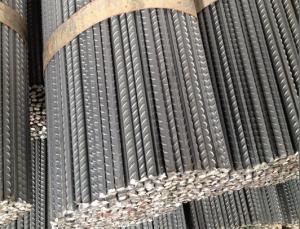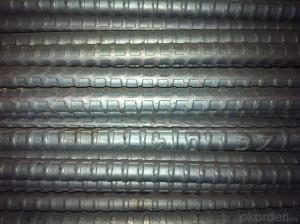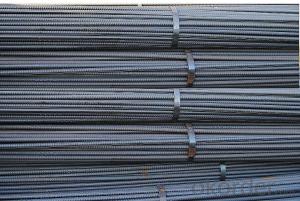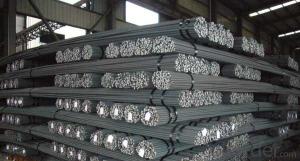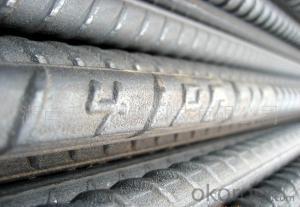ASTM A615 G60 8mm 10mm 12mm Deformed Steel Bar
- Loading Port:
- Qingdao
- Payment Terms:
- TT OR LC
- Min Order Qty:
- 5 m.t.
- Supply Capability:
- 100000 m.t./month
OKorder Service Pledge
Quality Product, Order Online Tracking, Timely Delivery
OKorder Financial Service
Credit Rating, Credit Services, Credit Purchasing
You Might Also Like
Specification
Type:
Carbon Steel,Spring Steel,Bearing Steel,Gear Steel,Deformed Steel,Stainless Steel,Alloy Steel
Shape:
Steel Coil,Steel Sheet,Steel Wire Rod,Steel Flat Bar,Steel Square Bar,Steel Angle,Steel Round Bar,Steel Billets
Technique:
Hot Rolled,Cold Rolled,Cold Drawn,ERW,Forged,Saw,Extruded,EFW,Spring
Surface Treatment:
Galvanized,Coated,Copper Coated,Color Coated,Oiled,Dry,Chromed Passivation,Polished,Bright,Black,PVDF Coated
Certification:
ISO,SGS,BV,IBR,RoHS,CE,API,BSI,UL
Thickness:
6mm-32mm
Width:
6mm-32mm
Length:
6-12m
Outer Diameter:
6mm-32mm
Net Weight:
100kg
Packaging:
seaworthy packaging
ASTM A615 G60 8mm 10mm 12mm Deformed Steel Bar
Detailed Information of ASTM A615 G60 8mm 10mm 12mm Deformed Steel Bar
| Name | Steel Round Bar |
| Shape | Round Bar/Square Bar/Flat Bar/Plate/Wire |
| Standard | GB/ASTM/SAE/AISI/DIN/JIS/EN/BS |
| Surface Treatment: | Black/Peeling/Polished/Machined |
| Delivery Condition: | Hot Rolled or Forged/Peeled or Black Surface |
| Test | SGS/UT 100% Elements Testing |
| Certificate: | ISO/Mill Certificate |
| Service: | 24 hours online service / |
| more than 20 years trading and manufacture | |
| Quality Assurance: | the third party inspection, such as SGS, BV, TUV…etc. is acceptable |
| Packaging Details: | Seaworthy Packaging or as per customer's packing instruction |
Product Overviews of ASTM A615 G60 8mm 10mm 12mm Deformed Steel Bar
| Product Name | Typical Grades | Diameter(mm) | Standard Adopted |
| Carbon Steel | 20 (1020/S20C/C22) | ||
| 40 (1040/S40C/C40) | Ø16-Ø300 | ||
| 45 (1045/S45C/C45) | |||
| Bearing Steel | GCr9 (51100/SUJ1) | ||
| GCr15 (52100/SUJ2/100Gr6) | Ø12-Ø250 | ||
| GCr9SiMn (A485-Gr.1/SUJ3) | GB/SAE/ | ||
| Cr-Mo Steel | 20Cr (5120/SCr420H/20Cr4) | JIS/DIN | |
| 40Cr (5140/SCr440/41Cr4) | Ø12-Ø250 | ||
| 42CrMo(4140/SCM440/42CrMo4) | |||
| Gear Steel | 20CrNiMo | ||
| 20CrMn(5115/SMnC420/20MnCr5) | Ø16-Ø600 | ||
| 20CrNiMo(8620/SNCM220/20CrMiMo2) |
Company Introduction of ASTM A615 G60 8mm 10mm 12mm Deformed Steel Bar
CNBM International Corporation is the most import and export platform of CNBM group(China National Building Material Group Corporation) ,which is a state-owned enterprise, ranked in 270th of Fortune Global 500 in 2015.
With its advantages, CNBM International are mainly concentrate on Cement, Glass, Iron and Steel, Ceramics industries and devotes herself for supplying high quality series of refractories as well as technical consultancies and logistics solution.
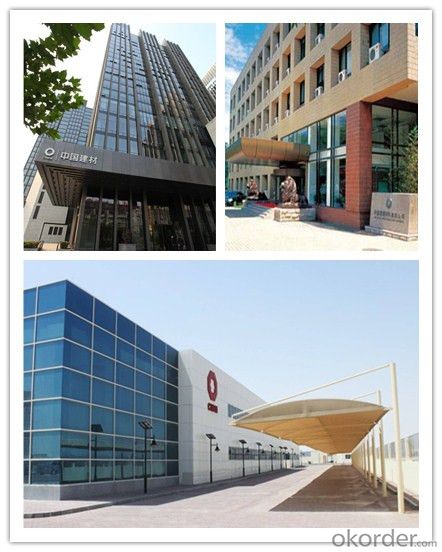
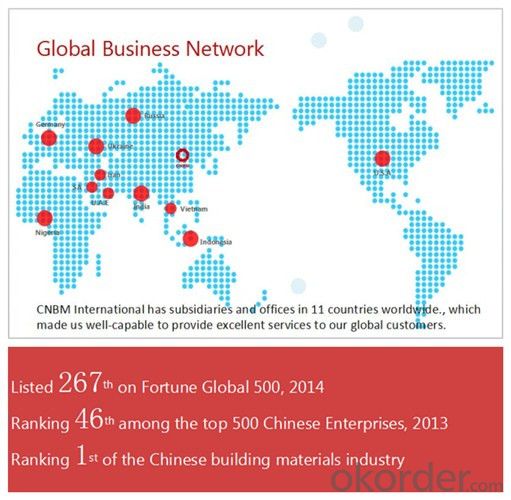
| After-sale service | l CNBM provides the services and support you need for every step of our cooperation. We’re the business partners you can trust; you can relax and get on with doing business. |
| l For any problem, please kindly contact us at any your convenient time, we’ll reply you in our first priority within 24 hours | |
| Advantages | l Industry experience over 20 years. |
| l Shipment of goods -More than 70 countries worldwide. | |
| l The most convenient transport and prompt delivery. | |
| l Competitive price with best service. | |
| l High technical production line with top quality products. | |
| l High reputation based on best quality products. | |
Packaging & Delivery of ASTM A615 G60 8mm 10mm 12mm Deformed Steel Bar
| Packaging Detail | Sea worthy packing /as per customer's packing instruction |
| Delivery Detail | 15 ~ 40 days after receiving the deposit |
Products Show
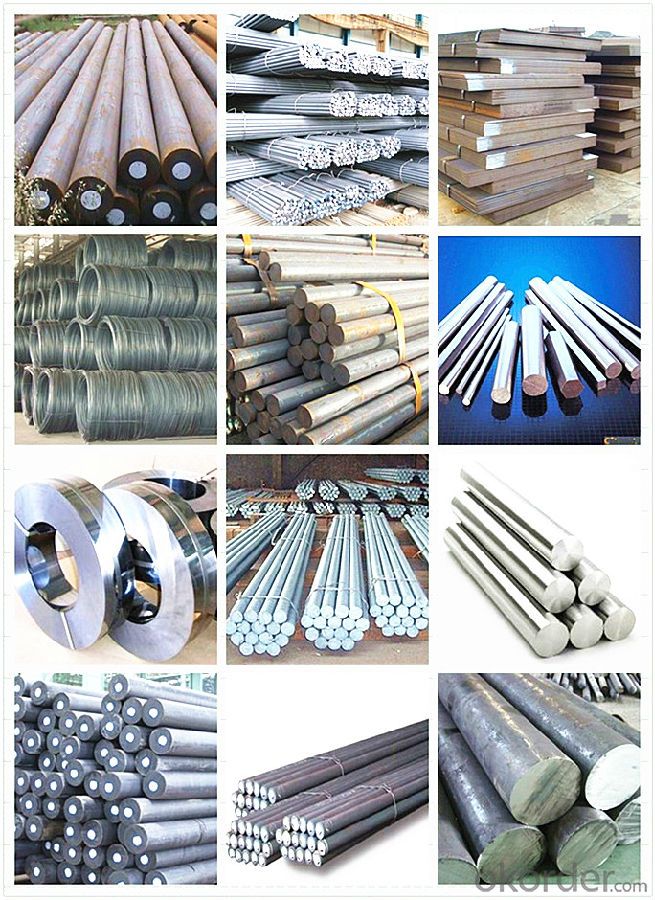
FAQ:
| Are you a trading company or manufacturer? | Manufacturer |
| What’s the MOQ? | 1000m2 |
| What’s your delivery time? | 15-20 days after downpayment received |
| Do you Accept OEM service? | Yes |
| what’s your delivery terms? | FOB/CFR/CIF |
| What's the Payment Terms? | 30% as deposit,70% before shipment by T/T |
| Western Union acceptable for small amount. | |
| L/C acceptable for large amount. | |
| Scrow ,Paybal,Alipay are also ok | |
| Why choose us? | Chose happens because of quality, then price, We can give you both. Additionally, we can also offer professional products inquiry, products knowledge train (for agents), smooth goods delivery, excellent customer solution proposals. |
| What's your available port of Shipment? | Main Port, China |
| What’s your featured services? | Our service formula: good quality+ good price+ good service=customer's trust |
| Where are your Market? | Covering more than 160 countries in the world |
- Q: What is the significance of carbon content in special steel?
- The carbon content in special steel is significant as it directly impacts the steel's strength, hardness, and overall performance. A higher carbon content typically results in a harder and stronger steel, making it suitable for applications that require durability and wear resistance, such as cutting tools or machinery components. On the other hand, a lower carbon content enhances the steel's toughness and ductility, making it more suitable for applications that require flexibility, such as structural components or automotive parts. Therefore, controlling the carbon content in special steel is crucial in tailoring its properties to meet specific industrial requirements.
- Q: What are the requirements for special steel used in construction equipment manufacturing?
- The requirements for manufacturing construction equipment using special steel are strict and specific. Below are some important requirements: 1. Strong: Special steel used in construction equipment manufacturing must have high tensile and yield strength to withstand heavy loads and stresses. This ensures the durability and longevity of the equipment. 2. Toughness: The steel should have excellent toughness to resist fractures and deformations caused by impacts or dynamic loading. This is crucial for construction equipment operating in challenging environments. 3. Resistance to wear: Construction equipment is exposed to abrasive forces such as digging, scraping, and crushing. Therefore, the special steel should have high wear resistance to prevent premature wear and failure. 4. Protection against corrosion: Construction equipment often operates in harsh environments like construction sites, mines, and marine applications. The steel should have good corrosion resistance to prevent rusting and corrosion, which can weaken the equipment's structure. 5. Weldability: Construction equipment manufacturing involves various fabrication processes, including welding. The special steel should be easily weldable to ensure proper joining and structural integrity without compromising strength. 6. Heat resistance: In certain construction applications, equipment may be exposed to high temperatures or thermal cycling. Special steel should have good heat resistance to maintain its mechanical properties and structural stability under these conditions. 7. Ability to be shaped: Construction equipment often has complex shapes and structures. The steel should be easily formable to allow for easy shaping and fabrication of the desired components without compromising its mechanical properties. 8. Cost-effective: While meeting the above requirements, special steel used in construction equipment manufacturing should also be economically feasible. This means balancing the desired properties with the cost of production and procurement. By meeting these requirements, the special steel used in construction equipment manufacturing can withstand demanding conditions, provide long-term durability, and ensure the safety and efficiency of the equipment. Additionally, compliance with industry standards and regulations is crucial to guarantee the quality and reliability of the steel used in construction equipment manufacturing.
- Q: What are the different surface finishing techniques for special steel parts?
- Special steel parts can undergo various surface finishing techniques to enhance their appearance, protect against corrosion, and improve overall performance. Some commonly utilized methods include: 1. Achieving a smooth and glossy surface on the steel part through polishing, using abrasives. This technique not only enhances aesthetics but also enhances resistance against corrosion. 2. Plating involves depositing a layer of metal onto the steel part's surface, with options such as chrome, nickel, and zinc. This technique provides additional protection against corrosion, improves wear resistance, and can offer desired color or finish. 3. Powder coating entails electrostatically applying a dry powder to the steel part's surface, followed by heat curing. The melted powder forms a durable and visually appealing coating that provides excellent resistance against corrosion, impact, and chemicals. 4. Anodizing, primarily used for aluminum but applicable to certain special steel parts, creates a controlled oxide layer on the surface. This enhances corrosion resistance, improves appearance, and can even provide insulation. 5. Employing a chemical process known as passivation removes free iron and contaminants from the steel part's surface. This process helps prevent corrosion and enhances resistance against staining or discoloration. 6. Heat treatment involves altering the physical and mechanical properties of the steel part by subjecting it to heating and cooling. This process improves hardness, strength, toughness, and provides desired surface finishes. 7. Through electropolishing, an electrochemical process, a thin layer of metal is removed from the steel part's surface. This technique eliminates surface imperfections, smoothens the part, and enhances corrosion resistance. Choosing the appropriate surface finishing technique is crucial, taking into consideration the specific requirements of the special steel part, including its function, desired appearance, and the environmental conditions it will encounter.
- Q: How does special steel perform in surface hardening applications?
- Special steel is known for its excellent performance in surface hardening applications. Surface hardening is a process used to increase the hardness and wear resistance of the outer layer of a metal component, while maintaining a tough and ductile core. Special steel, also known as alloy steel, is specifically designed to possess certain desirable properties, such as high strength, toughness, and resistance to corrosion and heat. When it comes to surface hardening, special steel exhibits superior characteristics compared to regular steel. Its alloying elements, such as chromium, molybdenum, and vanadium, enhance its hardenability, allowing for effective heat treatment processes like carburizing, nitriding, or induction hardening. These processes modify the surface microstructure of the steel, resulting in increased hardness and wear resistance. Special steel's ability to be hardened to a greater depth than regular steel makes it ideal for surface hardening applications. The hardened layer formed on the surface provides protection against abrasion, erosion, and fatigue, thus significantly extending the lifespan of the component. Additionally, the improved wear resistance and hardness of special steel make it suitable for applications in industries such as automotive, aerospace, and manufacturing, where components are subjected to extreme conditions and high levels of stress. Furthermore, special steel's exceptional mechanical properties make it highly durable even after surface hardening. It retains its toughness and strength, ensuring that the component can withstand heavy loads and impacts without failure. This combination of hardness and toughness is crucial for applications where both wear resistance and structural integrity are essential. In conclusion, special steel is highly effective in surface hardening applications due to its superior hardenability, wear resistance, and mechanical properties. Its ability to withstand extreme conditions and maintain its durability makes it a preferred choice for industries that require components with enhanced surface hardness and longevity.
- Q: Can special steel be used in the nuclear industry?
- Indeed, the nuclear industry finds special steel to be a valuable asset. This type of steel, also referred to as stainless steel, is commonly utilized in nuclear power plants due to its exceptional resistance to corrosion, impressive strength, and capability to endure high temperatures. Given the demanding conditions of nuclear reactors, which involve radiation exposure, high-pressure and high-temperature environments, as well as corrosive substances, the nuclear industry necessitates materials that can withstand such harsh circumstances. Special steel possesses properties that render it suitable for these conditions, including its corrosion resistance and ability to maintain mechanical properties at elevated temperatures. Furthermore, special steel plays a crucial role in the construction of nuclear fuel rods, storage containers, and other vital components. It is crucial to emphasize that the special steel employed in the nuclear industry is subject to rigorous quality control measures and testing in order to ensure its reliability and safety.
- Q: What are the different welding methods used for special steel?
- There are several welding methods that can be used for special steel, depending on the specific requirements of the project. Some of the commonly used welding methods for special steel include: 1. Gas Metal Arc Welding (GMAW): Also known as MIG welding, this method uses a consumable electrode and a shielding gas to protect the weld from atmospheric contamination. GMAW is ideal for welding special steel as it provides high-quality, clean welds with minimal spatter. 2. Gas Tungsten Arc Welding (GTAW): Also known as TIG welding, this method uses a non-consumable tungsten electrode and a shielding gas to protect the weld. GTAW is often used for special steel as it allows for precise control over the welding process, resulting in high-quality, defect-free welds. 3. Shielded Metal Arc Welding (SMAW): Also known as stick welding, this method uses a consumable electrode coated in flux to protect the weld. SMAW is commonly used for special steel as it is a versatile and portable method that can be used in various positions and environments. 4. Flux-cored Arc Welding (FCAW): This method uses a tubular electrode filled with flux to protect the weld. FCAW is often used for special steel as it provides high deposition rates and deep penetration, making it suitable for thicker materials. 5. Submerged Arc Welding (SAW): This method uses a continuously fed wire electrode and a granular flux that is applied around the weld. SAW is commonly used for special steel as it can produce high-quality, high-integrity welds in thick sections. It is important to note that the selection of the appropriate welding method for special steel depends on various factors such as the type and thickness of the steel, the desired weld quality, and the specific application requirements. Therefore, it is recommended to consult with welding professionals or engineers to determine the most suitable method for a particular project involving special steel.
- Q: What are the specific requirements for special steel used in the defense sector?
- The specific requirements for special steel used in the defense sector are highly demanding due to the critical nature of its applications. These requirements include: 1. Strength and Durability: Special steel used in the defense sector must possess exceptional strength and durability to withstand extreme conditions and resist wear and tear. It should be able to withstand high levels of stress, impact, and pressure. 2. Corrosion Resistance: Defense equipment often operates in harsh environments and is exposed to elements that can cause corrosion. Therefore, special steel used in the defense sector must have excellent corrosion resistance properties to ensure the longevity and reliability of the equipment. 3. Heat Resistance: Defense applications often involve exposure to high temperatures, such as in jet engines or armored vehicle components. Special steel used in these sectors must have the ability to retain its strength and structural integrity even at high temperatures. 4. Machinability and Weldability: Special steel used in the defense sector should have good machinability and weldability characteristics to facilitate the manufacturing and assembly processes. This allows for ease of fabrication, repair, and maintenance of the defense equipment. 5. Hardness and Toughness: Defense applications require special steel to have a combination of hardness and toughness. It should be able to resist penetration and deformation while maintaining the ability to absorb energy and resist fracture. 6. Non-Magnetic Properties: In certain defense applications, such as submarines and magnetic resonance imaging (MRI) equipment, non-magnetic properties are crucial. Special steel used in these sectors must possess low magnetic permeability to avoid interference with sensitive electronic systems. 7. Certification and Compliance: Special steel used in the defense sector must meet specific certification and compliance standards, such as those set by defense organizations or international quality management systems like ISO 9001. These standards ensure the quality, traceability, and reliability of the steel. Meeting these specific requirements for special steel used in the defense sector is vital to ensure the safety, effectiveness, and longevity of defense equipment and systems. Stringent testing and quality control processes are implemented to guarantee that the steel meets the required specifications and standards.
- Q: How does tool steel maintain its hardness at high temperatures?
- Tool steel maintains its hardness at high temperatures primarily due to its high carbon content and the presence of other alloying elements. The carbon in tool steel forms hard and wear-resistant carbides, which help retain hardness even at elevated temperatures. Additionally, alloying elements such as chromium, tungsten, molybdenum, and vanadium contribute to the formation of secondary carbides, which further enhance the steel's resistance to softening and maintain its hardness under high heat conditions.
- Q: What are the specific requirements for special steel used in the nuclear industry?
- Special steel used in the nuclear industry must meet specific requirements to ensure safety, durability, and reliability. These requirements include: 1. Radiation Resistance: Special steel used in the nuclear industry must possess high radiation resistance to withstand the intense radiation levels present in nuclear reactors. This means that the steel should have low neutron absorption and minimal degradation under irradiation. 2. High Strength and Toughness: Nuclear reactors operate under extreme conditions, including high temperatures and pressure. Special steel used in the nuclear industry must have excellent strength and toughness to withstand these conditions and prevent structural failure. 3. Corrosion Resistance: The steel used in nuclear applications must be highly resistant to corrosion, as exposure to corrosive environments can compromise the integrity of the reactor components. This involves the steel having low susceptibility to stress corrosion cracking, intergranular corrosion, and pitting corrosion. 4. Low Impurity Content: Special steel used in the nuclear industry must have a low impurity content to minimize the potential for radioactive contamination. Any impurities present in the steel can become activated and release radioactive particles, posing a significant safety hazard. 5. Thermal Stability: The steel must have excellent thermal stability to maintain its mechanical properties even under high-temperature conditions. This ensures that the steel remains reliable and performs as expected during prolonged exposure to elevated temperatures. 6. Non-Magnetic Properties: Some components in nuclear reactors require non-magnetic materials to prevent interference with sensitive instruments and equipment. Special steel used in these applications must possess non-magnetic properties to meet this requirement. 7. Regulatory Compliance: Special steel used in the nuclear industry must meet specific regulatory standards and certifications to ensure its suitability for use in nuclear facilities. These standards may vary depending on the country or region, but they typically encompass rigorous quality control, testing, and inspection procedures. Meeting these specific requirements for special steel used in the nuclear industry is crucial for maintaining the safety and integrity of nuclear reactors. Compliance with these standards ensures that the steel can withstand the harsh conditions and the potential hazards associated with nuclear power generation.
- Q: How is special steel used in the production of bearings for high-speed applications?
- Special steel is used in the production of bearings for high-speed applications due to its unique properties such as high strength, hardness, and resistance to wear and fatigue. These bearings are subjected to intense loads and rotational speeds, and special steel helps ensure optimal performance and longevity. The use of special steel in bearing production allows for improved precision, reduced friction, and increased durability, ultimately enabling bearings to withstand the demanding requirements of high-speed applications.
Send your message to us
ASTM A615 G60 8mm 10mm 12mm Deformed Steel Bar
- Loading Port:
- Qingdao
- Payment Terms:
- TT OR LC
- Min Order Qty:
- 5 m.t.
- Supply Capability:
- 100000 m.t./month
OKorder Service Pledge
Quality Product, Order Online Tracking, Timely Delivery
OKorder Financial Service
Credit Rating, Credit Services, Credit Purchasing
Similar products
Hot products
Hot Searches
Related keywords
